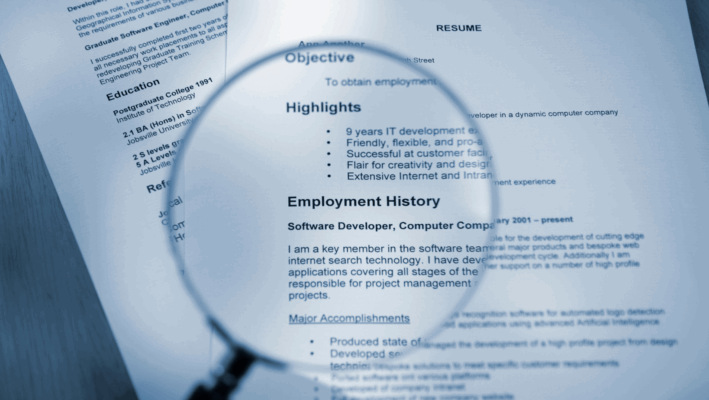What Is Employment Verification?
HR professionals and hiring managers are no strangers to the fact that job applicants stretch the truth, embellish, and often flat-out lie on their resumes. In fact, a recent study that surveyed 400 job seekers and 400 hiring managers found that 78% of job seekers misrepresent themselves on job applications.
Of those who admitted to enhancing their resume, 45% said their lying was moderate, and 3.3% said it was extreme.
In line with this spectrum of resume lying, there are certain resume enhancements that HR pros will sometimes turn a blind eye to (i.e. claiming mastery of a skill the candidate is only just grasping or listing a project the candidate has contributed to minimally), but there are also certain fabrications that hiring teams will not tolerate—at all.
Drawing the Line with False Employment Dates
Perhaps the most common example of the latter is when a candidate fabricates employment dates. This dishonest application tactic is often a “hard no” for employers (when they catch it) because it’s a pretty good indication that the candidate is trying to hide something that would otherwise prevent them from getting the role.
Usually, an employee will claim a longer tenure at a job to omit an employer from an eventual reference check or to cover up long periods of unemployment. False employment dates signal that there’s more to the story than how the candidate presents themselves and exposes flat-out dishonesty in the candidate—which could carry over to the workplace if hired.
Dishonest candidates pose a risk to the business down the line since dishonest employees threaten the integrity of a positive workplace culture, are more likely to steal from their employers, and could ultimately cause a skill shortage (since it’s likely they haven’t developed all the skills and expertise they say they have within the given time frame).
Catching Fabricated Employment Dates
That’s why many employers include employment verification as part of a comprehensive pre-employment background screening program. Employment verification is a quick and easy way to validate the accuracy and legitimacy of the information provided by candidates, and—with just some brief, straightforward data—employers can get a glimpse into a candidate’s trustworthiness, integrity, and reliability.
Most employment verifications are completed by contacting the workplace listed on the applicant’s resume to confirm that the applicant was employed there, how long they were employed, and the job titles held during their employment. This information not only gives employers insight into the credibility of the candidate, but also into their “fitness” for the job (since job titles are a pretty good indicator of a candidate’s level, skills, and abilities as it pertains to the role).
However, other companies choose to expand employment verification to include more qualitative, contextual information from previous employers—to learn about the candidate from the first-person perspective of their previous manager and to get a deeper understanding of the candidate’s skills (and how they’ll fit into the team). Usually, companies will conduct this kind of employment verification during a reference check.
The Best Way to Conduct Employment Verification
Whether they’re looking to conduct a simple, standard employment verification or to run a reference check-employment verification combo, most employers turn to a reputable background check service to do it for them since professional background check services are better equipped to get accurate results—and quickly.
At S2Verify, for example, we provide best-in-class employment verification via reference checks during the background screening process. When possible, references are checked through electronic verification resources. When unavailable, we call an applicant’s previous employer or supervisor—getting consistently faster, more in-depth results than an in-house resource.
Furthermore, we collaborate with our customers to develop legally approved scripts for use during reference calls—to ensure that all the information they care about is gathered. If the information collected during an employment verification matches the information provided on the applicant’s resume and reflects positively on their character, employers can proceed with confidence, knowing they’re making an informed hiring decision.







